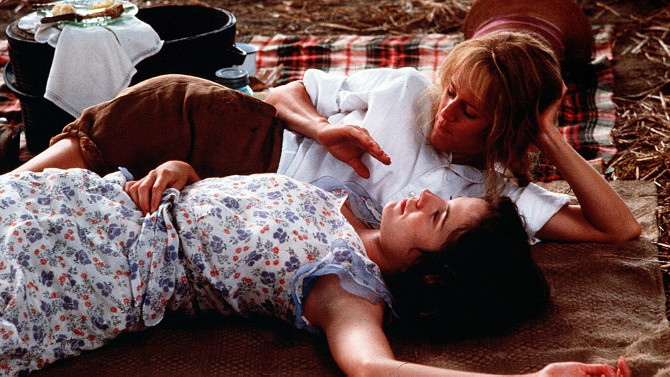Certain novels, and their respective films, capture the beautiful yet complicated nature of the American south. The Adventures of Tom Sawyer and To Kill a Mockingbird are two such examples. A third book that has been transformed into a motion picture that illustrates this intriguing subject is Jon Avnet’s 1991 movie Fried Green Tomatoes.
Fried Green Tomatoes starts much like many other films, with a random meeting that leads one character to divulge a tale from their storied past (à la Forrest Gump), yet this motion picture takes the interesting perspective of not only following the narrative being relayed by Ninny Threadgoode (Jessica Tandy – coming off an Oscar winning performance in Driving Miss Daisy two years earlier), but also showing us the life of listener Evelyn Couch (Kathy Bates – who took home Academy Award gold just a year earlier for Misery).
Set in the 1980’s, Ninny takes us back approximately seventy years to the quaint yet lively town of Whistle Stop, a place that, in the present, is ramshackle and all but deserted. She tells us the story of a free spirited ragamuffin tomboy named Idgie Threadgoode (played as a child by Nancy Moore Atchison, while the teen and adult portion is portrayed by Mary Stuart Masterson), a girl with a highly vivacious attitude. After a tragic and traumatizing incident in her early life, she thrives as a wandering vagabond gambler until family friend Ruth Jamison (Mary-Louise Parker) ropes her back into the fold on the behest of Idgie’s worried Mama (Lois Smith).
The two strike up a powerfully close bond over an entire summer, rubbing off on each other in interesting ways, until the effervescent Ruth must marry her fiancee Frank Bennett (Nick Searcy) and leave Whistle Stop. The saga continues, with the duo always intervening in each others’ lives. Their tale is intriguing, as the twosome deal with love, hate, racism, death, abuse, motherhood and a possible murder over the course of their adult lives.
The attentive Evelyn is mesmerized by the story. We watch the woman transform from a meek, timid, bored and unhappy housewife into a powerful, gregarious fireball of a woman. It is the unique bond that she forms with the lively aging dame and her engrossing tale that brings these changes about.
Fried Green Tomatoes is a lovely little story. It has moments that are both predictable and surprising, but its charm truly lies in the wonderful characters portrayed by the superb actors in the film, as well as in the era and locale it depicts. Each actor that is cast in their respective role, from supremely talented veteran performers Kathy Bates and Jessica Tandy, to early gigs for Mary-Louise Parker, Mary Stuart Masterson and Chris O’Donnell, adds flavour to the flick.
They create engaging characters that stand out and provide us with relatable references. We can understand Ninny’s yearning for her favourite food, fried green tomatoes, as she is stranded in an old folks’ home. Or we can relate to Evelyn’s frustration with the way she is treated by her oblivious, sports obsessed husband, or by the rude people that she bumps into during day to day life. There is an hilarious car scene that will likely illustrate a fantasy that many of us may have had at one point or another after dealing with ungracious individuals. Then, there is the loving connection between the two best friends, Idgie and Ruth. Their everlasting bond is extremely touching. They struggle with everything that life has to throw at them, but they still manage to run a thriving restaurant and never allow society’s cruel ilk to break them or their friendship down.
There is also something more than engrossing in the setting of the film. Depicting both the beauty and horrors of the first half of the twentieth century in the southern United States, we witness the freedom, love and bonds that a small town can create and nourish. Yet, there are also flashes of spousal abuse that would go unnoticed by most at that time, the racism along with the unwarranted actions of the Ku Klux Klan, and other such things that tarnish the simple and happy existence of the village and its mostly easygoing residents.
We are also being shown a dying way of life – though at this point, small town America was thriving. By flashing between the 1980s and the pre-World War 2 era, the audience is truly hit by how society has changed in such a short time. What was once a bustling little town set along the railway is now a shell of its former self, with only ramshackle buildings and a few elderly families remaining. There has been an exodus of the youth, all fleeing for the big city, with its hectic life and numerous jobs. The town is utterly silent, the train whistle that once put the city on the map, is no longer. It is the story that Ninny is telling that keeps the town, the former restaurant, and her nearly forgotten family alive for another generation – though only in wavering memory.
Fried Green Tomatoes is an excellent film adapted from a classic book (keep an eye open for a cameo of Fannie Flagg – author of the novel and also the co-writer of the film’s screenplay – she plays the teacher). She gets the characters, setting and tone right, making for an engaging motion picture that is sure to please. So, fry up some southern cuisine and grab a copy of this 1990’s flick – it sure is tasty.

